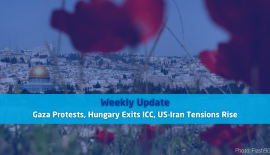Weekly Update: Tensions rise in Israel
Israel & Christians Today Weekly Update | 30thAugust 2019
Israel & Christians Today is a ministry of Christians for Israel, to promote understanding of Israel and world events from a Biblical perspective.
The process of the restoration of the Jewish people to the land is a complicated one. It is not just a question of the Lord suddenly moving all Jews back into the land in one instant. Rather, it is a slow and difficult process. In fact, several processes are happening at the same time, and all of them have to do with the restoration of Israel. These include: the turning of the hearts of the Jewish people towards God, so that they will be ready to receive their Messiah (Romans 11:25); the testing of the nations of the world regarding the way they deal with the Jewish people (Matthew 25); the rise of the spirit and person of the Anti-Christ at the end of the Roman empire (eg. Daniel 9); and the end-times gathering of the harvest of the Saints, and the separation of the wheat and the tares (see eg. Matthew 13).
So we shouldn’t be surprised that things often seem unclear and complicated. Our task as believers in the God of Israel is, amongst other things, to “watch and pray” (Luke 21:36). This means studying world affairs to “understand the times” we are living in (Matthew 16:3).
All things are pointing towards the imminent return of the Lord, to establish His Kingdom of peace and righteousness. Let us keep our hearts and minds on Him.
Alleged Israeli attacks on Iranian-sponsored targets in recent days – tensions rise
Over the last few days, there have been four attacks against sites in Syria, Lebanon, and Iraq which have been attributed to Israeli forces. It is not clear that all of the attacks are in fact Israeli, though Israel has taken responsibility for the attack in Syria near Damascus.
Michael Buchner reports in Times of Israel: “Tensions have shot up in recent days after Israel carried out airstrikes on Iranian and Iran-backed fighters in Syria to thwart what it said was a plot to fly explosives laden drones into the country. Jerusalem has also been blamed for airstrikes in Lebanon and Iraq, and Hezbollah terror chief Hassan Nasrallah gave a fiery speech Sunday in which he vowed revenge for the deaths of two of the group’s members.”
Go to the article..
The Australia/Israel and Jewish Affairs Council has compiled this overview to help observers understand the basic facts and context about the recent attacks.
The attacks in Lebanon resulted in a war of words between Hezbollah’s and Israel’s leaders. After Hezbollah leader Hassan Nasrallah on Sunday threatened retaliatory strikes against Israel, the deputy leader of the Iran-backed Lebanese terror group warned that his movement would deliver a “surprise” response in the coming days.Israeli Prime Minister Benjamin Netanyahu responded by warning Lebanon, Nasrallah and the head of Iran’s Quds Force to “be careful” with their words and actions. Netanyahu told a conference in Jerusalem that Nasrallah “knows very well that the State of Israel knows how to defend itself well, and to repay its enemies”.
Read article..
Is Israel at war with Iran?
The broader context, of course, is the efforts of Iran to expand its influence in the region through proxies like Hezbollah, and the intensifying conflict that is giving rise to between Iran on the one hand, and Israel and the USA on the other. According to Middle East analyst Jonathan Spyer, “Israel and Iran are at war. Israeli strikes this week in southern Syria, western Iraq and eastern Lebanon—and possibly even Beirut—confirm it. This war is a very 21st-century affair.”
Read article..
Turkey seeking more influence in the Middle East
Turkey is a key player in the Middle East. In light of the prophecies concerning “Gog and Magog” (see eg. Ezekiel 38-39), it is important to keep an eye on Turkey’s role in the region.
In this recent analysis, Middle East analyst Jonathan Spyer reports: “Turkey offers active support to the Muslim Brotherhood associated government in Libya, supplying drones to Tripoli in violation of a UN embargo in place since 2011. And of course Ankara supports the Hamas regime in Gaza. The Palestinian Islamist movement maintains an active office in Istanbul (which, according to recent defector Sohaib Hassan Yousif ‘operates security and military operations on Turkish soil under the cover of civil society.’) Turkey’s efforts to build influence in Jerusalem, by way of the activity of government linked aid agencies such as the Turkish Cooperation and Coordination Agency (TIKA) are also a matter of public record.”
Read article..
The Peace process, annexation and the “Two State” solution
In the lead-up to the Israeli elections in September, there is a lot of discussion in Israel about the future of the peace process with the Palestinians, including the future status of the West Bank. PM Netanyahu has publicly declared his willingness to annex parts of the West Bank. This is extremely controversial. In a recent letter to US Congress members, 25 former Israeli security officials warned that “[a]ny unilateral annexation of territory or extension of sovereignty to the West Bank will put Israel’s security and safety along with the well-being of its citizens at risk.” In response, 21 right-wing Israeli lawmakers in a letter to the congressmen asserted that a Palestinian state is “far more dangerous to Israel” than BDS.
In the meantime, the US Administration is preparing its political component of the “Deal of the Century”, the economic part of which was recently launched in Bahrain. Apparently the US Administration is considering using the concept of “autonomy” rather than “self-determination” or “statehood” – thus shedding further doubt on US support for Palestinian statehood. In this recent article published by BESA, Dr. Raphael G. Bouchnik-Chen looks at the notion of “Legitimate rights of the Palestinian people” that was included in the 1979 Camp David Accords, and the difference between the concepts of “Palestinian autonomy” and “self-determination” – the former is limited to some form of autonomy less than sovereignty, while the latter suggests the right to sovereignty or statehood.
Read article..
Moroccan Jews in Israel celebrate 60 years of Aliyah
Ilanit Chernik reports in The Jerusalem Post: “There are about one million Israeli Jews who are Moroccan or of Moroccan descent. The story of Moroccan Jewry’s immigration to Israel is not simple, beginning many years before the State of Israel was established.To mark their difficult journey home, as well as the major contributions Moroccan Jewry has made to Israeli society, the World Federation of Moroccan Jewry has organized dozens of events in the forthcoming months for the approximately one million Israeli Jews who are Moroccan or of Moroccan descent.”
Read article..
Further reading/viewing:
Read Rabbi Jonathan Sack’s latest weekly reflection. This week it is on “Simcha” – which he translates as “collective joy”.
Happy reading, and Shabbat shalom,
Andrew Tucker
Editor-in-Chief –Israel & Christians Today
Scripture for the week:
8 “‘But you, mountains of Israel, will produce branches and fruit for my people Israel, for they will soon come home. 9 I am concerned for you and will look on you with favor; you will be plowed and sown, 10 and I will cause many people to live on you—yes, all of Israel. The towns will be inhabited and the ruins rebuilt. 11 I will increase the number of people and animals living on you, and they will be fruitful and become numerous. I will settle people on you as in the past and will make you prosper more than before. Then you will know that I am the Lord. 12 I will cause people, my people Israel, to live on you. They will possess you, and you will be their inheritance; you will never again deprive them of their children.”(Ezekiel 36:8-12)
The goal of Israel & Christians Today is to help Christians to take God’s Word seriously, and study current events in the world in the context of the Bible.
Click here to subscribe.




